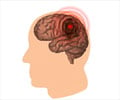Risk of stroke due to resistant hypertension increased by 35% in women and 20% in elderly Taiwanese patients, suggests a research presented at ESC Congress today by Dr Kuo-Yang Wang from Taiwan.

He continued: "Little is known about the prognosis of resistant hypertension in the Asian population. Our study compared the risk of all-cause mortality, acute coronary syndrome, and stroke between patients with resistant hypertension and non-resistant hypertension. We aimed to discover the impact of resistant hypertension on Taiwanese patients, and to ascertain whether patient characteristics influence the association between resistant hypertension and adverse outcomes."
Patients with hypertension aged 45 years and older were identified from the National Health Insurance Research Database. Medical records of 111,986 patients from 2000 to 2011 were reviewed for this study. Some 16,402 (14.6%) patients had resistant hypertension (defined as continuously concomitant use of 3 or more anti-hypertensive medications, including a diuretic, for 2 years or longer). The risk of major adverse cardiovascular events (MACE; a composite of all-cause mortality, acute coronary syndrome, and stroke) in patients with resistant hypertension and non-resistant hypertension was analysed.
The researchers found that 11,856 patients experienced MACE in the average 7.1 year follow up period. Patients with resistant hypertension had a 17% increased risk of MACE compared to those with non-resistant hypertension (figure 1). When the researchers analysed the risk of different types of cardiovascular events separately they found that compared to patients with non-resistant hypertension, patients with resistant hypertension had a 17% increased risk of stroke and a 34% increased risk of ischaemic stroke but no increased risk of all-cause mortality or acute coronary syndrome.
Dr. Wang said: "Our study shows that patients with resistant hypertension have higher risks for cardiovascular events than those with non-resistant hypertension. The elevated risks mainly contribute to increasing stroke events, especially ischaemic stroke."
Subgroup analysis showed that resistant hypertension increased the risks of stroke in females by 35% and in elderly patients by 20%. However, no significant influence was noted in young or male patients (figure 2).
Advertisement
He added: "While this is the first study to explore the relationship between gender, age, and MACE in patients with resistant hypertension, further research is needed to confirm this relationship and to identify the exact mechanisms involved."
Advertisement
Source-Eurekalert


![Pulmonary Arterial Hypertension [PAH] - Symptoms & Signs - Causes - Diagnosis - Treatment Pulmonary Arterial Hypertension [PAH] - Symptoms & Signs - Causes - Diagnosis - Treatment](https://images.medindia.net/patientinfo/120_100/pulmonary-arterial-hypertension-pah.jpg)












